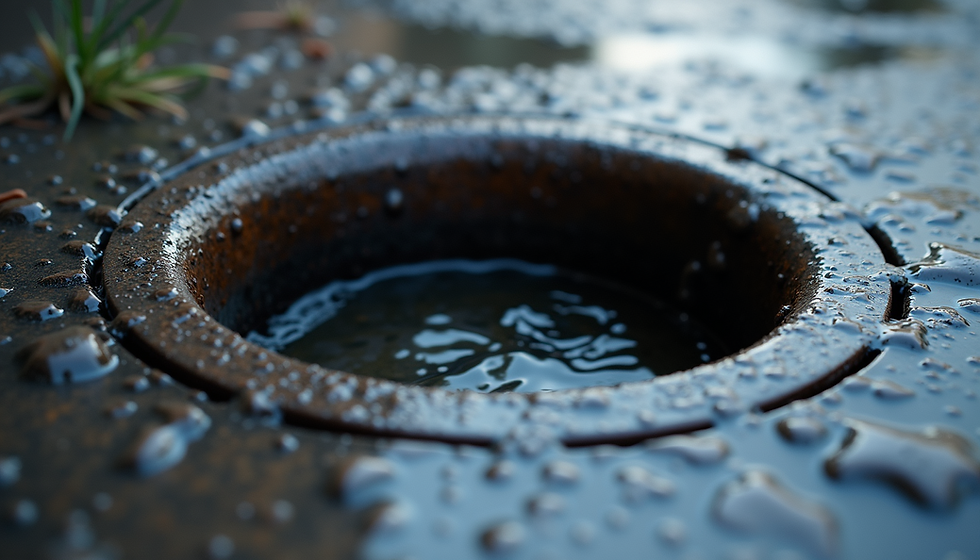Preventing and Solving Blocked Drains
- paulcleanadrain
- Sep 12
- 4 min read
Blocked drains can cause serious headaches for any property owner. Whether it’s a slow-draining sink or a completely clogged outdoor drain, these issues disrupt daily life and can lead to costly damage. Fortunately, there are practical ways to prevent blockages and effective solutions when problems arise. In this post, I’ll share clear advice on how to keep your drains flowing smoothly and what to do if you face a blockage in Sunderland.
Understanding Blocked Drain Solutions UK
Blocked drains are a common problem across the UK, especially in areas where older drainage systems may be more prone to issues. Knowing the right solutions can save you time, money, and stress.
What causes blocked drains?
Grease and fat buildup from cooking
Hair and soap scum in bathroom drains
Food scraps and debris in kitchen sinks
Tree roots invading underground pipes
Foreign objects accidentally flushed or washed down drains
How to prevent blockages:
Dispose of grease properly. Never pour cooking fat or oil down the sink. Instead, collect it in a container and throw it in the bin.
Use drain strainers. These catch hair and food particles before they enter the pipes.
Regular cleaning. Pour boiling water down your drains weekly to help dissolve minor grease and soap buildup.
Avoid flushing inappropriate items. Items like wet wipes, sanitary products, and cotton buds should never go down the toilet.
Inspect outdoor drains. Clear leaves and debris regularly to prevent blockages caused by natural buildup.
If you do encounter a blockage, it’s important to act quickly. Ignoring the problem can lead to water damage, unpleasant smells, and even structural issues.

How to Handle Blocked Drains: Practical Blocked Drain Solutions UK
When a drain blocks, you have several options depending on the severity of the problem. Here are some practical steps and solutions you can try:
DIY Methods for Minor Blockages
Plunger: A simple plunger can often clear minor blockages in sinks, toilets, and showers. Make sure to create a good seal and use firm, consistent pressure.
Drain snake: A manual drain snake or auger can reach deeper blockages and break them up. These are available at most hardware stores.
Baking soda and vinegar: Pour half a cup of baking soda followed by half a cup of vinegar down the drain. Let it fizz for 15 minutes, then flush with boiling water. This natural method can help clear minor grease and soap buildup.
When to Call a Professional
If these methods don’t work or if the blockage is severe, it’s time to call in experts. Professional drain unblocking services have the right tools and experience to handle tough blockages safely and effectively. They use techniques like high-pressure water jetting and CCTV drain surveys to identify and clear blockages without damaging your pipes.
For reliable and fast service, contact Clean A Drain LTD. They specialise in all types of drain problems and offer comprehensive solutions for homes and businesses in the North East.

Do the Council Deal with Blocked Drains?
Many people wonder if the local council is responsible for fixing blocked drains. The answer depends on the type of drain and where the blockage is located.
Public sewers: The council or water company is usually responsible for blockages in public sewers, which are the main pipes running under streets.
Private drains: Homeowners and businesses are responsible for blockages in private drains, which connect their property to the public sewer.
If you suspect the blockage is in a public sewer, you can contact your local council or water company to report the issue. They will investigate and take action if necessary. However, if the blockage is within your property’s drainage system, you will need to arrange for a private drainage specialist to clear it.
Knowing who is responsible helps avoid delays and ensures the problem is dealt with by the right people.

Tips for Maintaining Healthy Drains Year-Round
Preventing blockages is always better than fixing them. Here are some easy maintenance tips to keep your drains healthy throughout the year:
Regular inspections: Check your drains and gutters for signs of slow drainage or standing water. Early detection can prevent bigger problems.
Avoid chemical drain cleaners: These can damage pipes and harm the environment. Stick to natural methods or professional services.
Trim nearby trees: Roots can invade pipes and cause blockages. Keep trees and shrubs trimmed away from drainage lines.
Schedule professional checks: Consider having a drainage specialist inspect your system every couple of years. They can spot potential issues before they become emergencies.
By following these simple steps, you can reduce the risk of blockages and keep your property’s drainage system working efficiently.
When to Seek Emergency Drain Unblocking Services
Sometimes, blocked drains become urgent problems. Signs you need emergency help include:
Water backing up into sinks, baths, or toilets
Foul smells coming from drains
Flooding in your garden or property
Visible damage to pipes or manholes
In these cases, don’t wait. Contact a trusted drainage specialist immediately to prevent further damage. Fast response and expert care can save you from costly repairs and disruption.
If you’re in Newcastle Upon Tyne or the surrounding area, Clean A Drain LTD offers emergency services with quick response times and professional results.
Blocked drains don’t have to be a constant worry. With the right knowledge and a bit of care, you can prevent most blockages and handle any that do occur with confidence. Remember to act quickly, use safe methods, and call in professionals when needed. Your drains will thank you!




Comments